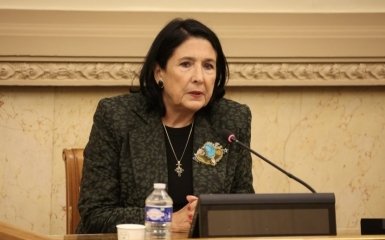Georgia's opposition president, Salome Zurabishvili, voluntarily left the presidential palace. Instead, pro-Russian Mikhail Kavelashvili was sworn in as the new president.
Points of attention
- Zurabishvili voluntarily left the presidential palace, and the new president, Kavelashvili, was sworn in, which caused a political crisis in Georgia.
- Kavelashvili's inauguration was deemed a parody by the opposition, leading to a boycott of the event by representatives of Europe and the United States.
- The opposition does not recognize the legitimacy of the new president and is ready to physically defend Zurabishvili at her residence on Atonal Street.
- The US has imposed sanctions against Georgian oligarch Ivanishvili for undermining democracy and Georgia's Euro-Atlantic future.
Zurabishvili voluntarily resigned from her position
Salome Zurabishvili came out to the participants of the protest near the Orbeliani Presidential Palace and addressed them with a speech.
Six years ago, I swore an oath to the Constitution, but even more so to the country and to you. I am leaving the palace, but I am staying with you. I am taking with me the legitimacy, the flag, and your trust,” Salome Zurabishvili said.
Zurabishvili also called the inauguration of new President Mikheil Kavelashvili a "parody."
Instead, the Georgian parliament held an oath-taking ceremony for Mikheil Kavelashvili, who was elected by the electoral college. Representatives from European countries and the United States were not invited to the inauguration.
According to the Constitution, Zurabishvili's powers ceased after the new president was sworn in. However, Zurabishvili herself and opposition politicians do not recognize Kavelashvili's legitimacy.
The Georgian opposition has said it is ready to physically defend Zurabishvili at her residence on Atonal Street. In turn, representatives of the ruling Georgian Dream party have threatened her with imprisonment if she refuses to leave office or attempts to dissolve parliament.
US announces sanctions against Georgian oligarch Ivanishvili
On December 27, official Washington decided to impose sanctions against Bidzina Grigoris Dze Ivanishvili, the founder and chairman of Georgia's ruling Georgian Dream party.
The US declared him persona non grata "for undermining Georgia's democratic and Euro-Atlantic future in favor of the Russian Federation."
The actions of Ivanishvili and the Georgian Dream have undermined democratic institutions, enabled human rights abuses, and restricted the exercise of fundamental freedoms in Georgia. They have also undermined Georgia's Euro-Atlantic future, a future that the vast majority of the Georgian people desire and that is enshrined in the Georgian Constitution.
What is important to understand is that as a result, Georgia has become vulnerable to Russia, which continues to occupy over 20% of Georgian territory.




